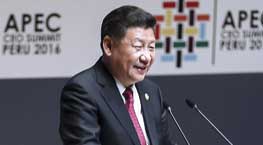by Edna Alcantara, Luis Brito
MEXICO CITY, Dec. 16 (Xinhua) -- American policy toward Latin America and the Caribbean will be focused on just a few countries under a Donald Trump administration, including Cuba and Mexico, said experts interviewed by Xinhua.
"The relationship will be focused on Mexico, Central America and Cuba for the wrong reasons because of (existing) problems," said Director of the International Studies Center of the College of Mexico Ana Covarrubias.
"There will be a great indifference toward South America. I don't think Trump has ever mentioned South America," Covarrubias added.
Jose del Tronco, professor at the Latin American Faculty of Social Sciences, said that Trump has not shown any sign of continuing President Barack Obama's attempts to restore ties with the region.
However, he pointed out that while the United States is still the region's most important trading partner, it has been steadily losing ground to China over the past decade, especially on Brazil and Chile.
While it is clear Cuba will be a major point on Trump's agenda, it remains unclear whether he will pursue or dismantle the rapprochement that began in 2014, after five decades of frozen relations.
For Covarrubias, Trump will also have to strike a balance between American companies keen on doing business with Cuba and the radical Cuban-American electorate which voted for him and is vehemently opposed to the Castro government.
Mexico and Central America will have Trump's attention because of migration, as he alleged migrants are causing security problems in the United States.
Trump has threatened to dismantle or revise the North American Free Trade Agreement (NAFTA) signed by the United States, Canada and Mexico in 1994.
Central America also has a free-trade agreement with the United States. The Dominician Republic Free Trade Agreement (CAFTA-DR) was signed in 2005 and currently includes the United States, the Dominican Republic, El Salvador, Costa Rica, Guatemala, Nicaragua and Honduras. Panama has a separate free trade agreement with Washington.
A report published this week by the Economic Commission for Latin America and the Caribbean (ECLAC) showed that Mexico and Central America export most of their manufacturing and services to the United States.
The possible renegotiation of NAFTA and other free trade agreements, coupled with uncertainties about a drop in remittances from the United States to Mexico and Central America, would lead to a "significant" impact on regional growth, ECLAC warned.










